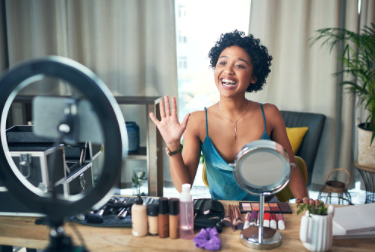An Influencer is a professional figure born in the digital era, and their work is of fundamental importance for communication on social networks. Many companies collaborate with influencers to promote their products or services to a wider audience. In recent years, these figures have had more and more impact on the lives of their followers. Influencers often use Instagram filters seeking “perfectionism”. The filters make them look like they have perfectly soft skin, bigger lips, the facial structure looks sharper and skinnier.
“Perfectionism” has had a huge impact on the “regular” people, especially women. It has also provoked pressure on body image and body shaming. Therefore, in Norway, for the first time, the use of social filters by influencers to retouch bodies is banned unless specified.
Social media advertising sometimes is altered due to the use of filters.
The Scandinavian country is trying to avoid unrealistic and potentially harmful standards of beauty thanks to legislation that makes it illegal to share promotional images on social media without declaring the changes. From now on, retouched bodies must be marked with a filter, and all advertisements with images altered by filters, apps, and graphic programs must contain a standard tag.
The new legislation will cover any alteration that affects the appearance of body size, shape, or skin, including even the use of simple Instagram filters. The law will come into effect from summer 2022 and, in the first phase, will only cover posts with advertising content. Those who do not mark edited photos will have to pay fines. The use of filters that alter the image, reduction of size, changes to color or shape of the skin will have to be made explicit. The use of filters on landscapes will not have to be made explicit.
The main objective is to fight the negative impact that such advertising has on young people. It has been studied that there is a real correlation between these images we are subjected to every day, and the social insecurity, low self-esteem, or pressure on the body.
Whereas previously retouching was only reserved for models and celebrities on the pages of magazines and advertisements, it has now become available to everyone. With new apps and filters, everyone can both beautify and retouch their own photos and those of others. Thanks to the law, retouched photos on social media should be marked. this is because altered images on social media support a mental health crisis and create a distorted image of beauty.
As the Norwegian ministry declared: “the measure will hopefully make a useful and significant contribution to curbing the negative impact that such advertising has, especially on children and young people”. With this provision, Norwegian influencers and celebrities will no longer be allowed to retouch advertising photos posted on their social media unless the alteration is clearly marked. The aim is to encourage as many people as possible not to depend on a filter when they want to post a selfie.
The Scandinavians have coined a neologism for this problem “Kroppspress”. A form of psychological pressure that is used for advertising purposes, to make a consumer product more attractive or to influence the behavior of the population that is exposed to it.
Concerns about the young generation

Christine Sundgot-Borgen is a postdoctoral and specializes in topics such as self-esteem and body image among young people. Social media can be a nice thing, and an important social arena, especially in antisocial times like during the pandemic. She shares her concerns while explaining that it is not necessarily the amount of time spent on social media that is the big problem, but what the time is spent on.
Especially content that triggers comparison that is destructive and is so easy to fall into. It is what clearly threatens self-esteem, body image and then mental health. We know that we can’t trust everything that is on social media. These days everything can be tricked, retouched and manipulated. That contributes to the normalization of unrealistic bodies that many compare themselves with.
New Phenomenom
Christine refers to a research study that shows that constantly being exposed to “the perfect body” on social media has a negative effect on self-image and mental health. We can see that there is an increasing focus on appearance among both boys and girls, precisely because of social media. You express yourself visually and get feedback on how you look in the form of likes and comments. It creates a need for the perfect look.

She adds that the focus on body pressure is a relatively new phenomenon and that the basis for comparing with previous generations is poor. The country wants to avoid the use of the body to convey commercial messages and preserve the effect it can have on new generations. Norway wants to protect consumers, especially young and influential ones, from being constantly bombarded with unrealistic images of absolute perfection that may lead to diverse disorders. Both mental and physical.
Do you think that this change could change the world of digital marketing and advertising?
Could this be a more positive and healthy advertising change?
Click here for more interesting topics.





Recent Comments